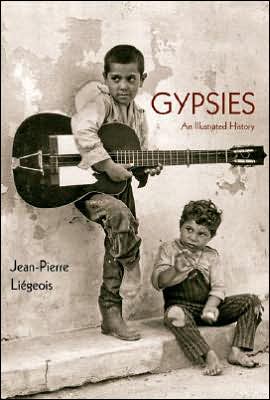

 |

|

The average rating for Gypsies An Illustrated History based on 2 reviews is 4 stars.
Review # 1 was written on 2009-02-03 00:00:00 Lee Thompson Lee ThompsonA photographical (black & white photos) history of the Gypsy people. I learned about their history, where the word "gypsy" comes from, their cultural values and norms, and other interesting tidbits. I can finally say learned about the wandering Gypsy and what sets them apart from other contemporary cultural enclaves. |
Review # 2 was written on 2019-05-16 00:00:00 Dan Jamson Dan JamsonThere are definitely some parts of this book that I did not agree with, and that underscore the wide degree of trouble that comes from trying to speculate on the origins of the Gypsies being from India when, as has been correctly noted, the Romany people clearly have a lot of other historical and cultural influences as well, and do not appear like their supposed neighbors in India had been, even if their language does appear to be an Indo-Aryan one of considerable antiquity. Aside from the speculations about Romany origins, though, this book does a good job at pointing out the vulnerabilities that have existed with regards to their relationship with outsiders, where a high degree of hostility and a desire to take advantage of the gadje on the part of the Romany is matched by frequent hostility from people as well as governments in the areas where the Romany have lived, to the point where individual freedoms have sometimes been granted but where group identity and recognition of the identity of the Romany as a whole has sometimes been problematic. One cannot help but compare the struggles for legitimacy and belonging of the Romany with that of the Jews, although the author appears reluctant to do so. The less than 200 pages of this book are divided into several chapters. After opening with a series of black and white photographs of various Sinti and Roma peoples and their material culture, the author begins with an introduction and then spends a fair bit of time speculating on origins using language as the basis (is there a reluctance on the part of Roma to DNA analysis?). After that the author spends some time looking at Gypsy society, including the nature of family authority and group institutions that help to preserve peace and well-being within society as well as providing an acceptable face towards outsiders. An entire chapter is spent exploring the relationships between Gypsies and non-gypsies, where there is a high degree of mutual stigmatization between the various groups. After that the author looks at the changing times that have taken place given the more strict border rules and the growing spread of settled society that has left a good deal less freedom to roam on the part of the Roma in many places, while the last chapter of the book discusses some of the ways that the Gypsies have responded to contemporary threats through seeking to politically organize and draw attention to their plight in a way that would have been unthinkable in the past. I do not consider myself to be particularly knowledgeable about the Roma and their lives, nor do I find the lifestyle of an illiterate nomad to be particularly appealing (and books are by no means an easy sort of culture to bring in one's wanderings, as I know all too well [1]). That said, I do find the struggle on the part of the various peoples of the Roma to have a space space to live as they wish without government interference or hostility from the settled peoples around them to be a poignant one. As someone who tends to struggle with fitting in who has lived a life of considerable wandering, I have a high degree of empathy at least for the struggles faced by the Roma even if I am definitely an outsider to their ways. Yet societies at present, even ones as mobile as our own, still leave a great deal of difficulty for those who wish to be itinerant and whose technical competence and education are not very high even now. There is a lot of room for very poisonous relations between the Roma and those societies whom they live in but remain very distinct from. [1] |
CAN'T FIND WHAT YOU'RE LOOKING FOR? CLICK HERE!!!